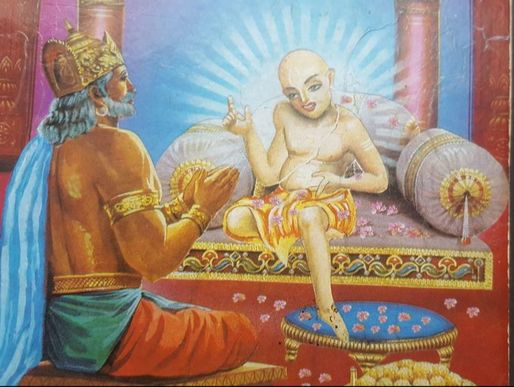|
Ashtavakra – the Self-Realised Saint Sri Ashtavakra is a revered Vedic sage in Hinduism. His name literally means "eight bends", reflecting the eight physical handicaps he was born with. As per historians, the period of Sri Astavakra lived over 7000 years ago. However, as per Vedic calculations, it may be over one to two lakhs years ago. Guru Ashtavakra, a self-realized saint of Advaita philosophy, held dialogue with the disciple King Janaka of Mithila Kingdom on self-realization or enlightenment. Ashtavakra Gita (298 Sutras, 20 chapters) or song of Sri Ashtavakra is the detailed account of this dialogue. Three legends are popular relating to Ashtavakra as under:
1. Astavakra preach about spiritual experience or enlightenment as under: a. People reside in body, mind, buddhi and ego where he feels about pleasure-pain. Anger, greed, attachment, lust etc. arise from them. b. Away from body, mind, buddhi and ego, is pure consciousness (Jivatma, soul). Jivatma is non-doer, non-enjoyer, not bound but only witness. Experience of Jivatma is moksha. All individual jivatma combined together are Brahman. c. Sri Ashtavakra claims that spiritual experience or enlightenment or wisdom (आत्मज्ञान) can be instantaneous. However, it has three requisites viz. one should be seeker, one should be is worthy for it and presence of enlightened teacher (सद्गुरु). d. To be worthy, one should be free from ego, absolute surrender, free from sentiments (feelings, attitudes) of body & mind, emptiness from knowledge of scriptures and make himself free from external benefits.
मोको कहाँ ढूंढे रे बन्दे | मै तो तेरे पास में | ना तीरथ में ना मूरत में |ना एकांत निवास में | ना मंदिर में ना मस्जिद में | ना काबे कैलास में | ना में जप में ना में तप में | ना में बरत उपास में | ना में क्रिया करम में रहता |नहिं जोग संन्यास में | ना ब्रह्माण्ड आकाश में | ना में प्रकृति प्रवार गुफा में | नहिं स्वांसो की स्वांस में | खोजि होए तुरत मिल जाऊं | इक पल की तालास में |कहत कबीर सुनो भई साधो |मै तो हूँ विश्वास में | Where do you search me? I am with you, Not in pilgrimage, nor in icons; Neither in solitary living; Not in temples, nor in mosques; Neither in Kaba nor in Kailas; Not in prayers, nor in meditation; Neither in fasting or prohibition; Not in vedic procedure; Nor in yogic postures; Not even in sky or universe; Neither in womb of nature; Not in the breath of the breaths; If you are a true seeker; In a moment than you discover; Says Kabir, listen with care, where your faith is, I am there. List of the chapters and topics are as under: Chapter 1: It all starts when King Janaka asks the sage Ashtavakra how he can attain Knowledge, detachment, liberation. Ashtavakra tells him.
Chapter 2: It works! Upon hearing Ashtavakra’s words Janaka realizes his True Nature. Enraptured, he describes the joy and wonder of his new state. Chapter 3: Ashtavakra is delighted for Janaka but sees inconsistencies. He fires off a series of confrontational verses about attachment to worldly pleasure. Chapter 4: Janaka asserts that the Lord of the Universe can do as he pleases. Chapter 5: Ashtavakra does not disagree, but in a terse four verses points to the next step—dissolution. Chapter 6: Janaka says “I know that already,” matching him in style and number of verses. Chapter 7: Unable to leave it at that, however, Janaka goes on to further describe his enlightened state. Chapter 8: Still hearing too much “I” in Janaka’s language, Ashtavakra instructs him in the subtleties of attachment and bondage. Chapter 9: Ashtavakra continues to describe the way of true detachment. Chapter 10: Ashtavakra hammers away at the folly of desire—no matter how elevated or subtle. Chapter 11: Ashtavakra further describes the state of desirelessness to which he points. Chapter 12: Janaka replies by describing the state of timeless stillness in which he now finds himself. Chapter 13: Janaka, having been instructed by Ashtavakra in Chapter One to “be happy,” reports that he indeed is. Chapter 14: Janaka then summarizes his exalted state with calm indifference. Chapter 15: Impressed but not through teaching, Ashtavakra relentlessly points to the vast emptiness of Self. Chapter 16: Ashtavakra attacks the futility of effort and knowing. Chapter 17: Ashtavakra describes the nature of one who is truly free. Chapter 18: Finally, Ashtavakra hits him with everything he’s got—100 verses of pure non-duality. If this doesn’t do it, nothing will. Chapter 19: It works! Janaka no longer describes his enlightened state, but can speak only in questions revealing absence. Chapter 20: In a final flurry of questions pointing only at their own meaninglessness, Janaka burns off the last vestiges of personhood and enters dissolution. He ends with: “No more can be said.” Ashtavakra smiles, nods approvingly, and says no more One shall realise that enlightened saints are born in Bharat who not only had deep knowledge about Jivatma, Pramatma and universe but also experienced the almighty. Reference:
1 Comment
Venkatesh Prasanna on m
4/29/2020 06:37:30 am
Very informative and inspiring.
Reply
Leave a Reply. |
Archives
May 2024
Categories |

 RSS Feed
RSS Feed